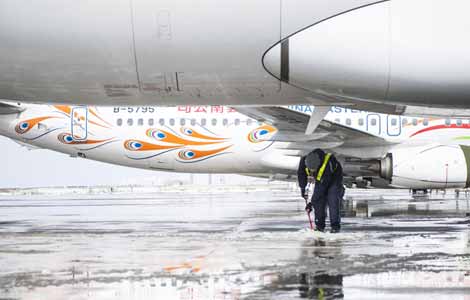System for organ donors test
Updated: 2013-12-18 01:43
By Hou Liqiang and Wang Qingyun (China Daily)
|
||||||||
China's computerized organ-allocation system was used successfully for the first time in Beijing on Tuesday, as donated organs from a 47-year-old man were transplanted into three patients on Tuesday.
The donor died on Dec 7 from a cerebral hemorrhage in a suburban Beijing hospital.
"When he was alive, he once said that he hoped he could help other people continue their lives after he died," said a family member of the donor who declined to be identified.
The donated organs were the liver and both kidneys, all going to patients waiting for transplants at Peking University People's Hospital.
"The transplant surgeries were successful, and the three recipients are in good condition," said Zhu Jiye, director of the liver and gallbladder surgical department of the hospital, which participated in the transplant surgery.
The liver recipient is a man from the Xinjiang Uygur autonomous region who was suffering from liver failure.
"The organ-allocation system showed he was the person who most needed the organ. If he hadn't received the liver, he could not have lived for more than seven days," Zhu told China Daily.
It is the first time in Beijing that donated organs were allocated by the China Organ Transplant Response System and transplanted to patients in need, according to a hospital news release. Previously, it is more like a hospital-based organ allocation.
The China Organ Transplant Response System is a nationwide computer-based organ allocation system that aims to fairly distribute the organs of a donor after death. The system began earlier this year, and some donated organs already have been transplanted to patients in other cities.
Zhu said the donated organs went to three patients in his hospital because "the system allocated the organs according to priority of location, the degree of emergency and the degree to which the organs match the patients".
Currently, 300,000 to 500,000 people in China are waiting for kidney transplants, Zhu said.
"If relatives of those who are brain-dead agree to donate the victims' organs, it would help a lot to relieve the shortage," he said.
"This case set a very good example for relatives of those people who are brain-dead and will help a lot to change people's minds about donating organs after their death."
Many people die while waiting for organ transplants because of the shortage of organ sources, said Gao Jie, a doctor in the liver and gallbladder surgical department of Peking University People's Hospital.
"I hope the successful transplants from people who are brain-dead can make more people willing to donate organs," Gao added.
Contact the writers at houliqiang@chinadaily.com.cn and wangqingyun@chinadaily.com.cn
 Russia to bail out Ukraine for $15 billion
Russia to bail out Ukraine for $15 billion
 Fatal tiger attack 'points to flaws in zoo management'
Fatal tiger attack 'points to flaws in zoo management'
 Merkel sworn in as chancellor for a third term
Merkel sworn in as chancellor for a third term
 Life in poetry
Life in poetry
 US first lady visits children in medical center
US first lady visits children in medical center
 Harvard reopens after bomb scare
Harvard reopens after bomb scare
 Snowstorms cause chaos for travelers in Yunnan
Snowstorms cause chaos for travelers in Yunnan
 Kerry offers Hanoi aid in maritime dispute
Kerry offers Hanoi aid in maritime dispute
Most Viewed
Editor's Picks

|

|

|

|

|

|
Today's Top News
Vast deposits of 'flammable ice' found
Russia to bail out Ukraine for $15 billion
System for organ donors test
Luxury market cooling down
Court to issue guide on private loan cases
US budget deal clears crucial vote in Senate
Japan seeks bigger role for military
Hukou reforms target 2020: official
US Weekly

|

|







